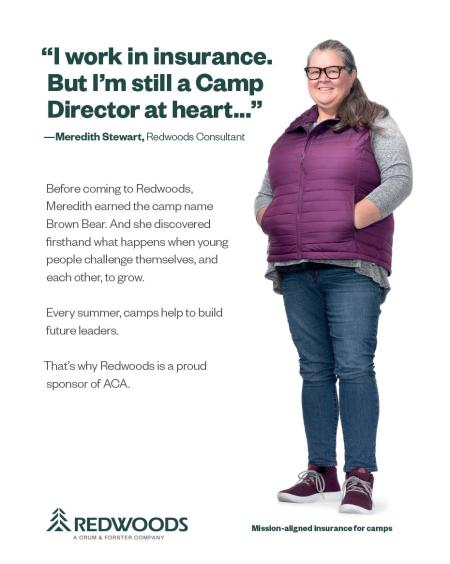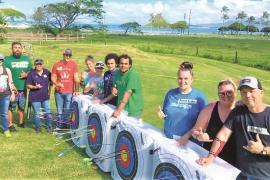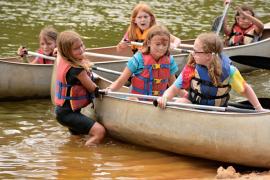I attest my confidence in making friends, trying new things, and even my success in college to the time I spent at summer camp. I went for a month each summer from age 12 to 16. The industry, culture, and experience of camps are collaborative, joyful, and dedicated to enriching children’s lives. That said, navigating summer camp as a teenager was often confusing, embarrassing, and painful — as is now navigating how to work with teenage campers as a director in my mid-20s.
The day-to-day operation of a midsize overnight summer camp is unlike any other ecosystem. Young counselors from all corners of the globe usher tribes of tiny, shrieking maniacs between this activity and that performance in the blazing heat and for little pay. We directors are called upon to problem-solve on all levels at all times, tackling homesickness, allergic reactions, broken equipment, flash floods, peer-to-peer conflict, peer-to-staff conflict, and other things we block out with selective memory. But handling teenage-related catastrophes is definitely on the list.
Teenage campers can terrify the staff. And each other. And themselves. (I can’t count the times a counselor has stormed off, burst into tears, or threatened to quit after some incident involving the teenagers.) Last summer, at camp in northwest Connecticut, we dealt with camper-to-camper groping and harassment, contagious eating disorders, escapees, and numerous vape-related episodes. More than any other age group, the teenagers managed to earn a serious talking to, were put on behavioral contracts, or were sent home.
Of course, such behavior isn’t specific to camp, one particular summer, or that group of kids. Peer pressure; lashing out; and experimentation with boundaries, rules, language, drugs, and sex come with the teenage territory. But camp has a unique capacity to shape the identities and futures of these kids within a two-week session. A camp’s values, structures, and staff training can set up a safe, supportive place for teens to develop. Or they can set up an isolated, judgmental environment that fosters bullying and abuse.
Summer camp — with its rich tradition, goofy rituals, songs, skits, competitions, screaming, and sprinting — is emotionally and physically intense. For many campers and counselors, it’s the first time they’ve been away from a city, their families, and their phones. It’s the first time they’ve slept outside, shared a bathroom with 40 people, zip-lined, described their favorite memory around a fire, or used the name and pronoun they want. Sufficient support through these experiences and self-reflection opportunities can cultivate kids’ confidence and help them build lifelong friendships.
The counselors and directors who are the most effective in supporting teen campers are not necessarily the oldest or most experienced. They are, however, good at these key things:
- Setting boundaries
- Modeling behavior
- Encouraging goofiness
- Assuming positive intent
Navigational Challenges
Younger campers are rapt by their counselors during active times, carefully noting their form as they demonstrate how to shoot an arrow or do a layup. Teenage campers are far more interested in the staff during downtime when their guards are down. They are obsessed with staff relationships and drama, secrets, and insecurities. They whisper about staff body language and who came back in what car after their day off.
Navigating these topics with teenagers can be a challenge. Sharing dreams, likes, and dislikes can unquestionably help build relationships with teen campers. However, it is a fallacy that participating in their gossip will secure their trust. In my experience, counselors who are timely and neutral about shutting down inappropriate questions or topics receive more respect and make their campers feel safer in the end.
Camp offers so many baked-in reflection opportunities — at dinner, during campfire, before bed. And though these spaces and events are extraordinary in building community, children, teens, and even staff may feel pressure to share inappropriate, emotional, or traumatic stories. Sometimes, when adults cry during such sharing, kids will cry because they’re moved, but more often they’ll cry because they’re anxious and uncomfortable. Staff that effectively encourage campers to feel their feelings but only if they have them — especially through modeling that behavior — make a big difference.
That is another challenge: modeling good communication, conflict resolution, emotional regulation, kindness, and responsibility — even when staff are exhausted, dehydrated, and missing home themselves. Counselors who complain about each other in front of kids, raise their voices in frustration, chat during performances — and heaven forbid, get caught using their phones during the day — are frequently to blame for the same behaviors in the campers they supervise.
A Power Struggle
Though setting boundaries and modeling behavior are great ways to keep kids safe, they’re at camp to have fun. And, apparently, having fun can be hard. Even previously angelic, longtime return campers show up one summer with their arms crossed and their eyes in a perpetual roll. A power struggle always occurs between returning teen campers and first-year staff. “That’s not the quickest path.” “Those are not the words.”
During the first campfire of the session, the teen campers sit as far back from the center as possible, smirking at the songs, climbing into each other’s laps, and asking to be excused to “use the bathroom.” Camp directors may dread that day — introducing themselves, nagging the teens to stand up and join in. But what they need is encouragement to let go, the permission to look silly, and the reminder that if they want to act like kids, we’ll let them. They deserve it.
Gratitude
I’m forever grateful to the counselors who gave me permission to look goofy when I was 15. I distinctly recall them making us hold hands in a circle on the first day and spin as fast as we could. I remember how embarrassed I was but then how quickly and easily it broke the ice. I’ve been making kids do it ever since.
Maybe the toughest task of all is not letting the teenagers convince us that they’re demonic and that they think everything is stupid and terrible.
Last summer, a handful of staff overheard the teen boys ranking the teen girls on a 1–10 scale. The direct supervisor of that group was furious at first. Still, she approached them calmly and from a place of inquiry. She said she just wanted to understand why they did it and how they thought the act might make someone feel. They were quiet until one boy admitted that his school friend had offhandedly ranked him an eight.
“I thought about it for weeks,” the boy said. “Where did those two points go? What was I missing?” There was vigorous nodding and snapping (we snap at camp to signify agreement — like everything is a slam-poetry event).
“It’s a TikTok thing,” another explained, “Like, ‘She’s a 10, but she showers once a week.’ It’s a trend.” More snaps. As a result of that conversation, it was much easier to agree with the teens about behavior, feelings, and consequences.
At another point, a teen camper went home because a friend had disclosed sneaking a vaping device into camp and made her promise not to snitch. The secret made the girl so anxious that she sobbed in the office for two hours, and her parents eventually came to pick her up. When the friend was quietly pulled aside after breakfast and asked about it, she denied vaping and was thanked for her time. However, come lunchtime she admitted she’d been addicted to vaping for months and didn’t know how to quit. She was scared of going through withdrawal at camp, of her parents, and that she wouldn’t be allowed back to her home away from home. Instead of kicking her out, we put her on an occasionally effective behavioral contract. Her signature on the document represented an admittance that she had hurt others and a promise to make better choices next time.
Similar conflicts have many times been handled horribly. Usually, it’s because a staff member assumes that all teenagers are cruel, lack empathy, and have settled into who they’ll be forever.
In the middle of the summer, it was apparent that one counselor wasn’t sitting with her teen campers during meals. She would eat at other tables or stand for an hour with her plate in one hand and fork in the other. When asked why, she said, “They’re rude. They talk about inappropriate things and pretend to be sick so they can go to the nurse and eat cough drops and sit in the air conditioning.”
Her explanation led to a challenging but compelling conversation. The conclusion: “No matter how much you don’t like the kids or think they don’t like you, it’s your responsibility to meet them every day with kindness. How you treat them can’t change. You do not have beef with children. Only children have beef with children.”
As it turned out, her campers were hurt and confused by her ignoring them.
Our staff training is extensive, but clearly not exhaustive. For 10 days, the directorial team leads discussions, lectures, and activities covering child abuse, bullying, mental health awareness, diversity and equity, and many other essential topics. But one result of this training can be that staff are understandably anxious about working with teens. Some of them are still teens themselves, and some are recent campers who are still friends with current ones.
Some staff beg not to be placed with the teenagers for personal reasons. Camp counselors have had panic attacks after learning they’d be living with teens for the summer. They had unresolved anguish and were still afraid of ninth graders. They feared they would be made fun of, not taken seriously, or even bullied. Not a ridiculous fear — but in some ways, those are the perfect people for the job. They can identify with the kids who experience things similar to what they went through as teens.
The camp environment can actually exacerbate teenage problems. At camp, we don’t talk about the news. A camper without a watch probably won’t know what time it is. The dining hall staff take care of three meals a day, and even cars driving by are rare. This isolation can make crushes and conflicts feel more intense. When one friend is upset with another, that three hours of silent treatment feels like a week. Every Australian counselor is somehow the hottest person the teenagers have ever seen, and every word out of their mouths around said hottie threatens death by embarrassment. Campers change in and out of clothes and bathing suits all day, are in constant view of each other’s bodies, and in bathrooms where counselors may be just out of sight and earshot. At camp teens can reinvent themselves or ultimately reveal themselves, but finding time alone is difficult. (As I said, having fun can be hard.)
Partial Solutions
The solutions that’ve come over the years are primarily preventative and still works in progress. Do establish the camp rules explicitly and out loud on the first night of each session, and give campers a grace period to hand over any contraband anonymously.
At our camp, we’re developing a document for parents and teens to sign before they get to camp that explicitly acknowledges our zero-tolerance policies. That list now includes making gender, race, or disability-related jokes.
We’re working on degenderizing events, activities, and spaces. We’ve found that these aggravate social problems, pressures, and expectations. The dining hall is often a triggering space for the girls+ side. We train counselors to never congratulate or thank campers for eating and offer campers and counselors replacement phrases for body comments and food talk, such as, “I love your sense of style,” or, “Make sure you eat enough to fuel yourself for the day.”
Our dress code no longer mentions skin or body parts. It only asserts that campers and staff must be dressed appropriately for each activity. For example, swimsuits are useful in the pool, not on the climbing tower.
Truth: I’m unsure if any of these efforts will stop teen campers from making each other feel bad — or if they would have helped me when I was 14. I won’t tell teenagers that being a teenager isn’t hard — just that they can do hard things. We all can.
Violet Piper is a writer, camp director, personal assistant, and astrophysicist living in New York City. She has published essays and poems in Slate, The Blue Mountain Review, Olit, and Harpur Palate.




